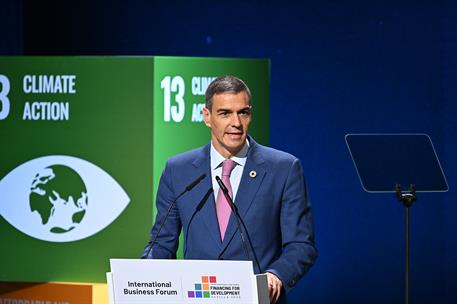4th International Conference on Financing for Development
Pedro Sánchez announces a national mechanism of up to 60 million euros a year for debt relief for developing countries
President's News - 2025.7.1
FIBES Conference and Exhibition Centre, Seville
The President of the Government of Spain, Pedro Sánchez, during his speech at the event "Forging a Common Agenda to Achieve Debt Sustainability in Developing Countries" (Pool Moncloa/Borja Puig de la Bellacasa)
The President of the Government of Spain, Pedro Sánchez, today advocated a "profound change" in the international debt architecture", through "ambitious and innovative solutions based on international cooperation and solidarity", which would turn this financial instrument into "an engine of investment, resilience and stability" for developing countries.
This was stated during his speech at a special event on debt, organised by Spain and South Africa, within the framework of the 4th UN International Conference on International Financing for Development, which is being held in Seville.
Sánchez announced some of Spain's proposals on debt, such as the "creation of a Debt Suspension Clause Alliance", which brings together sovereign borrowers, lenders, multilateral banks, the private sector and credit rating agencies, with the aim of providing greater consistency and scope to these clauses, which temporarily suspend debt service payments in the event of natural disasters and crises, and promoting their regular inclusion in loan contracts, both public and private, to stop developing countries frrom entering into liquidity crises and default.
Secondly, Sánchez pointed out that Spain has launched an initiative to promote debt for development swaps, a tool, in the president's words, that allows for "two challenges to be addressed at once: alleviating the debt burden and redirecting resources towards investments in climate action, sustainable infrastructure, health and education". The initiative, framed within the Seville Platform for Action, will lead to the establishment of a Global Hub for Debt Swaps for Development within the World Bank. This hub will serve as a platform for sharing experiences, generating knowledge and building technical capacity", and, at the same time, "help create common approaches to swaps, support their design and implementation, and promote their adoption by both official and private creditors".
The President of the Government of Spain, Pedro Sánchez, at the event on debt sustainability for developing countries | Pool Moncloa/Borja Puig de la Bellacasa
The President of the Government of Spain also pointed out that "Spain will launch a national mechanism to channel up to 60 million euros a year in debt relief to developing countries". Resources that "will be reinvested directly and transparently in sustainable development programmes," he said.
Lastly, Sánchez stressed that our country supports a proposal defended by the Jubilee Commission, based on an initial Spanish proposal: a multilateral fund that would allow countries to buy back their own debt at a discount in the secondary market. "Instead of allowing these assets to end up in the hands of speculative investors, we should help and facilitate countries themselves to buy back their debt at reduced prices, thereby easing their financial burden and freeing up resources for development," the president stressed, noting that such a fund could be backed by Special Drawing Rights to provide concessional loans to eligible developing countries. "This is a realistic proposal. It is aligned with social justice and is consistent with the goal of building a more resilient and just global financial architecture," he said.
"In conclusion, we are at a moment of real opportunity to transform sovereign debt management. Marginal adjustments are not enough. We need ambitious and innovative solutions based on international cooperation and solidarity, and Spain is fully committed to this process," he stressed.
Bilateral Meetings and Other Encounters
During the second day of the Conference, Pedro Sánchez held further bilateral meetings with Heads of State and Government and other internationally renowned authorities. One of the meetings was with the President of the Republic of Honduras, Xiomara Castro, with whom he signed a Country Partnership Framework. The President of the Government of Spain also met with the President of the Republic of Senegal, Bassirou Diomaye Faye; with the President of the Republic of North Macedonia, Gordana Siljanovska-Davkova; and with the President of the African Union, Ali Yusuf.
In addition, Pedro Sánchez spoke with economist Mariana Mazzucato.
Non official translation







